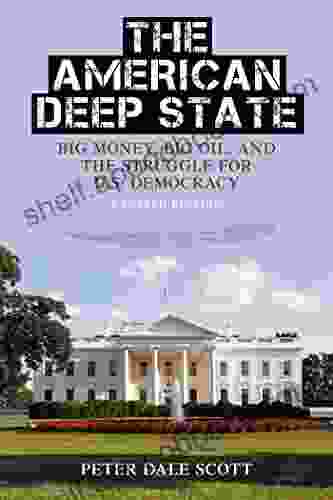Race, Media, and the Politics of Antipoverty Policy: A Critical Examination

This book examines the ways in which race and media shape the politics of antipoverty policy in the United States. It draws on a range of theoretical perspectives to analyze how media representations of poverty and race influence public opinion, policy debates, and the implementation of antipoverty programs. The book also examines the role of race and media in shaping the experiences of people living in poverty.
Race and Media Representations of Poverty
The media play a powerful role in shaping public perceptions of poverty. Media representations of poverty often rely on stereotypes and tropes that reinforce negative views of poor people. These representations can contribute to the stigmatization of poverty and make it more difficult for people living in poverty to access the resources they need.
4 out of 5
| Language | : | English |
| File size | : | 6183 KB |
| Text-to-Speech | : | Enabled |
| Screen Reader | : | Supported |
| Enhanced typesetting | : | Enabled |
| Word Wise | : | Enabled |
| Print length | : | 303 pages |
| Lending | : | Enabled |
For example, media representations of poverty often focus on the individual characteristics of poor people, such as their lack of motivation or their poor decision-making skills. These representations ignore the structural factors that contribute to poverty, such as racism, discrimination, and lack of opportunity. As a result, they can lead people to believe that poverty is a personal failing rather than a societal problem.
Race and Media Influence on Policy Debates
Media representations of poverty also influence policy debates about antipoverty programs. By framing poverty as a problem of individual responsibility, the media can make it more difficult to build support for policies that address the structural causes of poverty. For example, media coverage of welfare reform in the 1990s often focused on the negative consequences of welfare for individual families. This coverage helped to create a public backlash against welfare and made it easier for policymakers to pass legislation that made it more difficult for people to access welfare benefits.
Race and Media Impact on Program Implementation
Media representations of poverty can also affect the implementation of antipoverty programs. For example, media coverage of homelessness often focuses on the visible signs of homelessness, such as people living on the streets or in shelters. This coverage can lead to public pressure for policies that focus on moving homeless people out of sight rather than addressing the underlying causes of homelessness.
The Role of Race and Media in Shaping Lived Experiences
In addition to shaping public opinion and policy debates, race and media also play a role in shaping the experiences of people living in poverty. Media representations of poverty can affect how people living in poverty see themselves and their own experiences. They can also affect how people living in poverty are treated by others.
For example, media representations of poverty often portray people living in poverty as lazy, irresponsible, or dangerous. This can lead to discrimination against people living in poverty in employment, housing, and other areas of life. It can also make it more difficult for people living in poverty to access the resources they need to improve their lives.
This book provides a critical examination of the ways in which race and media shape the politics of antipoverty policy in the United States. It draws on a range of theoretical perspectives to analyze how media representations of poverty and race influence public opinion, policy debates, and the implementation of antipoverty programs. The book also examines the role of race and media in shaping the experiences of people living in poverty.
This book is essential reading for anyone interested in the politics of antipoverty policy, the role of media in society, or the experiences of people living in poverty.
4 out of 5
| Language | : | English |
| File size | : | 6183 KB |
| Text-to-Speech | : | Enabled |
| Screen Reader | : | Supported |
| Enhanced typesetting | : | Enabled |
| Word Wise | : | Enabled |
| Print length | : | 303 pages |
| Lending | : | Enabled |
Do you want to contribute by writing guest posts on this blog?
Please contact us and send us a resume of previous articles that you have written.
 Book
Book Novel
Novel Page
Page Chapter
Chapter Text
Text Story
Story Genre
Genre Reader
Reader Library
Library Paperback
Paperback E-book
E-book Magazine
Magazine Newspaper
Newspaper Paragraph
Paragraph Sentence
Sentence Bookmark
Bookmark Shelf
Shelf Glossary
Glossary Bibliography
Bibliography Foreword
Foreword Preface
Preface Synopsis
Synopsis Annotation
Annotation Footnote
Footnote Manuscript
Manuscript Scroll
Scroll Codex
Codex Tome
Tome Bestseller
Bestseller Classics
Classics Library card
Library card Narrative
Narrative Biography
Biography Autobiography
Autobiography Memoir
Memoir Reference
Reference Encyclopedia
Encyclopedia Matthew Rowe
Matthew Rowe Virginia Cox
Virginia Cox Didier Jourdan
Didier Jourdan Don Rhodes
Don Rhodes Italo Svevo
Italo Svevo Dominic Keller
Dominic Keller Langley Gray
Langley Gray Francis R Valeo
Francis R Valeo James S Bowman
James S Bowman Farida Jalalzai
Farida Jalalzai Don Brown
Don Brown Marcella Denise Spencer
Marcella Denise Spencer Jan Kubik
Jan Kubik Michel Tremblay
Michel Tremblay Paul Valent
Paul Valent Donald L Robertson
Donald L Robertson Shirlee Emmons
Shirlee Emmons Matthew Rahaim
Matthew Rahaim Louis Alexandre Berg
Louis Alexandre Berg Roy E Stolworthy
Roy E Stolworthy
Light bulbAdvertise smarter! Our strategic ad space ensures maximum exposure. Reserve your spot today!

 Jerome BlairRise of Artificial Intelligence Terrorlands: Unraveling the Impact of AI on...
Jerome BlairRise of Artificial Intelligence Terrorlands: Unraveling the Impact of AI on... Junot DíazMy Dawn Is Only Five Hours Away: A Beacon of Hope and Healing in the Face of...
Junot DíazMy Dawn Is Only Five Hours Away: A Beacon of Hope and Healing in the Face of... Arthur MasonFollow ·13.7k
Arthur MasonFollow ·13.7k Jack ButlerFollow ·12.4k
Jack ButlerFollow ·12.4k Justin BellFollow ·6.6k
Justin BellFollow ·6.6k Jorge AmadoFollow ·2.9k
Jorge AmadoFollow ·2.9k John GrishamFollow ·9.9k
John GrishamFollow ·9.9k Howard BlairFollow ·4.6k
Howard BlairFollow ·4.6k Dwight BellFollow ·6.7k
Dwight BellFollow ·6.7k John UpdikeFollow ·14.1k
John UpdikeFollow ·14.1k

 Larry Reed
Larry ReedBig Money, Big Oil, and the Struggle for Democracy
By [Author's Name] In this...

 Jackson Blair
Jackson BlairUnleash Your Creativity with The Ultimate Guide to Cricut...
Welcome to the extraordinary world of Cricut...

 Glen Powell
Glen PowellTo the American Public: Uncovering the Hidden Truths and...
An Incisive and Urgent Call to...

 Bryce Foster
Bryce FosterUltimate Guide to Starting a Mini Food Truck Business:...
: Embracing the Mobile Culinary...

 John Steinbeck
John SteinbeckHow To Make Different Styles Of Flute From Around The...
Embark on a...
4 out of 5
| Language | : | English |
| File size | : | 6183 KB |
| Text-to-Speech | : | Enabled |
| Screen Reader | : | Supported |
| Enhanced typesetting | : | Enabled |
| Word Wise | : | Enabled |
| Print length | : | 303 pages |
| Lending | : | Enabled |










